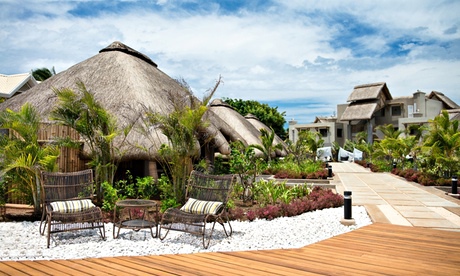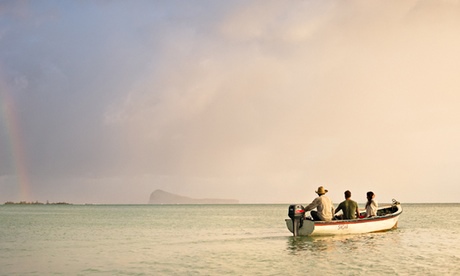“You can pretend you’re a peasant here. But at our time of life, we don’t want to live like peasants.” The concept behind Mauritius’s newest hotel, the four-star Zilwa Attitude in Kalodyne on the north coast, has not been appreciated by all its guests. Ken, 69, from Doncaster, has little time for its “live like an islander” philosophy, which includes rustic decor inspired by traditional seaside bungalows. But, after 65 all-inclusive holidays in the past eight years, he and his wife perhaps have more fixed expectations than most. Others might not consider four swimming pools, five restaurants and two private islands to be exactly roughing it.
Zilwa, which means “islander” in Creole, is the latest venture from Attitude, a Mauritian company that has nine hotels around the island. Its aim is to give guests a taste of the “real” Mauritius – but is that ever possible in a luxury resort? Mauritius is not a particularly poor country in global terms: it is classed as an upper middle-income economy by the World Bank, and its GDP per capita is more than ,500, one of the highest in Africa. But it is still a lot poorer than France, Germany and Britain, where most of the hotel’s guests originate, and everyday life in the villages is very different to the lazy days in all-inclusive hotels.
I had previously visited the country for a Mauritian friend’s wedding: renting a cheap apartment, visiting his family, eating at snack bars. I ask my friend, Sebastien, if this kind of experience can be replicated in a four-star hotel. “The hotels can give you the perception of a Mauritian experience – a sega dancing night and Mauritian food once a week – but that’s it,” he says. “However, it is possible to experience the real Mauritius if you rent a car, avoid the hotel restaurant and talk with locals.” His tips for an authentic experience include going fishing, shopping in the village of Goodlands and betting at the horse races in the city of Port Louis.

I was surprised to find that Zilwa encourages guests to leave the hotel and try most of these activities. “So many people come and stay in their resort,” says Katia Veerapen, the hotel’s sales and events co-ordinator. “Why would you come all this way and not see the island? It’s crazy! We say go.” So we went: to the nearby village of Goodlands by bike. Our guide, Jason, took us to his favourite street-food stalls to eat gateaux piments (chilli cakes) and dholl puri (stuffed flatbreads). It is best to visit Goodlands early in the morning on market day (Tuesday and Friday), but it is bustling at any time.
Zilwa also arranges dawn boat trips with fishermen. We went out with Dessy on his bright yellow pirogue, a flat-bottomed boat propelled by a eucalyptus pole. We didn’t fish, just sailed as the sun rose, watched other fishing boats setting off and chatted about the fisherman’s life. Dessy explained that the boats leave later on “lazy Mondays”, because families have all-day beach barbecues on Sundays – washed down with a lot of rum. We landed on his village beach at Cap Malheureux for breakfast and an early-morning dip. Local women were already there, swimming and doing callisthenics.
There are also plenty of Mauritian activities to try at the hotel. We had a Creole lesson; played a traditional Mauritian game (sapsiway, a version of keepie uppie); had a cookery demonstration; and learned to make lychee-infused rum. We also sampled the infamous beach barbecue on Gran Zil, the larger of the hotel’s two tiny islands. You can reach it by raft, kayak or swim – at low tide, you can practically walk. That morning they had caught an octopus, so we had a delicious octopus curry with pilaf. And, of course, several tots of rum.
An even better culinary experience was dinner at a family’s home. Vish, the hotel’s bar manager, took us to his parents’ house in the village of Saint François. His mum spoiled us with gateux piments, lentil soup, fish curry with chutneys and pickles and breads, fresh mango, cardamom tea … while Vish kept the rum and cokes topped up. His family often host hotel guests, who have been known to stay as late 3am. The hotel restaurants don’t offer quite as much local food as they might. The best bet for local cuisine is the Taba-J snack bar, which serves spicy seafood rougaille, pickles and farata bread, plus a dish of the day.

There are lots of nice Mauritian design touches throughout the resort: thatched, shingle and red pitched roofs; Creole riddles on the wall; wooden furniture made by local craftsmen. Occasionally, the authenticity detracts from the comfort – to my shame, I longed for some posh toiletries rather than the traditional square soaps provided. But usually it adds to the experience, particularly the bright paintings inspired by Malcolm de Chazal, a much-loved local artist.
The staff – almost all of whom are Mauritian – are well-versed in the “islander” concept (they all attend a workshop that explains the hotel’s aims). The company targets unemployed workers in Kalodyne in particular, offering literacy and basic skills courses – some of them are then recruited by the hotel. There is also a profit-sharing scheme for staff, which is rare on the island. The Attitude group has provided bins for public beaches, bought equipment and uniforms for poor schoolchildren and funded leisure activities in the villages (a twice-weekly aerobics class in Kalodyne, for example).
I’m still not convinced that you can really get to grips with a country from the comforts of a luxury hotel, but Zilwa goes further than most in giving guests an authentic experience, and does some good at the same time. Despite breaking new ground in Mauritius, however, Ken has seen it all before. “Concrete floors? We had those in Goa 15 years ago – and we were glad to see the back of them!”
• The trip was provided by Hayes & Jarvis, which has a seven-day all-inclusive holiday at the Zilwa Attitude from £1,199pp, including return flights from Gatwick. Breakfast with a fisherman is an extra £6, lunch on Gran Zil is £20, dinner with a family is £15, the rum workshop is free but bottles of rum are £8; all other activities are included
guardian.co.uk © Guardian News & Media Limited 2010
Published via the Guardian News Feed plugin for WordPress.

